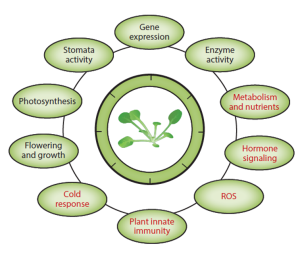Prelecionista: Ms. Francisco Henrique Nunes da Silva Alves. Data: 15/06/2021, às 16:00 horas pelo ZOOM*. Orientador: Jorge Luis Badel Pacheco.
Plants developed and use sophisticated mechanisms to anticipate and contain invasions by pathogens and pests. In this seminar, an overview of the circadian clock influence on plant defense responses to pathogen attack will be discussed. The circadian cycle is an intrinsic time maintenance mechanism, corresponding to a 24-hour period, on which the biological cycle of almost all living organisms is based. Many living organisms on Earth have developed the ability to measure time, using the circadian cycle, to synchronize day and night and seasonal changes as well as to regulate their metabolism, physiology and behavior according to external stimuli such as light, temperature and the presence of pathogens. A precisely tuned circadian cycle is critical for the growth and development of many organisms, including plants. It provides fitness and competitive advantages to organisms under unfavorable conditions. Recent evidence suggests that the circadian cycle functions as a fundamental and integral part of the plant defense system, favoring the development of fast and accurate responses. Light, one of the main synchronizing mechanisms of the circadian cycle, influences plant defense responses, including hypersensitivity reactions and defense signaling. In arrhythmic plants, with circadian cycle dysfunction, interruptions in their responses to pathogen invasions and increased susceptibility occur. This integration between the circadian cycle and the plant innate immunity is important for the redistribution of limited resources to ensure proper plant growth and development and effective responses to biotic stresses. The discovery of genes associated with the circadian cycle and their influence on the plant defense system may help to develop new strategies for controlling economically important diseases.
*Interessados contatar pos.fitopatologia@ufv.br para solicitar o link do Zoom.

